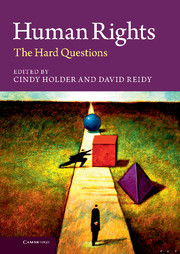Book contents
- Frontmatter
- Contents
- Figure
- List of table
- Notes on contributors
- Introduction
- Part I What are human rights?
- Part II How do human rights relate to group rights and culture?
- Part III What do human rights require of the global economy?
- Part IV How do human rights relate to environmental policy?
- Part V Is there a human right to democracy?
- 14 Is there a human right to democracy?
- 15 The human right to democracy and its global import
- 16 An egalitarian argument for a human right to democracy
- Part VI What are the limits of rights enforcement?
- Part VII Are human rights progressive?
- Index
- References
16 - An egalitarian argument for a human right to democracy
Published online by Cambridge University Press: 05 May 2013
- Frontmatter
- Contents
- Figure
- List of table
- Notes on contributors
- Introduction
- Part I What are human rights?
- Part II How do human rights relate to group rights and culture?
- Part III What do human rights require of the global economy?
- Part IV How do human rights relate to environmental policy?
- Part V Is there a human right to democracy?
- 14 Is there a human right to democracy?
- 15 The human right to democracy and its global import
- 16 An egalitarian argument for a human right to democracy
- Part VI What are the limits of rights enforcement?
- Part VII Are human rights progressive?
- Index
- References
Summary
Introduction
Democracy is often defended on the grounds that it treats the members of society as equals by giving them an equal say in the process of collective decision-making. Yet the question remains of whether there is a human right to democracy or a right that ought to be realized in every society and that ought to receive the protection of the international community. What makes this a hard question is that it may seem that the human right to democracy is incompatible with the legitimate self-determination of peoples, at least when these peoples do not accept the egalitarianism at the heart of democracy (Cohen 2010). Elsewhere I have argued in favor of a human right to democracy by tying it instrumentally very closely with other human rights that are less controversial (Christiano 2011a). In this chapter I want to suggest that the traditional argument for democracy may provide the basis for a limited defense of a human right to democracy and that this argument holds even for those societies that do not accept the principle of equality.
The general argument is very simple. It proceeds in two steps, which correspond to the two dimensions of human rights as I conceive of them. In the first step I give a general argument for democratic institutions in domestic societies. In the second step I proceed from the traditional democratic premise that people have a right to a say in the institutions that have serious effects on their lives, to the thought that individuals ought to have a say in the process of the construction of international institutions and law. But in the absence of the possibility of meaningful global democracy it is a necessary condition of persons participating as equals in the shaping of the international environment that they have an equal say in the political institutions of their society that participate in creating international law and in diplomatic relations with other societies.
- Type
- Chapter
- Information
- Human RightsThe Hard Questions, pp. 301 - 326Publisher: Cambridge University PressPrint publication year: 2013
References
- 6
- Cited by

